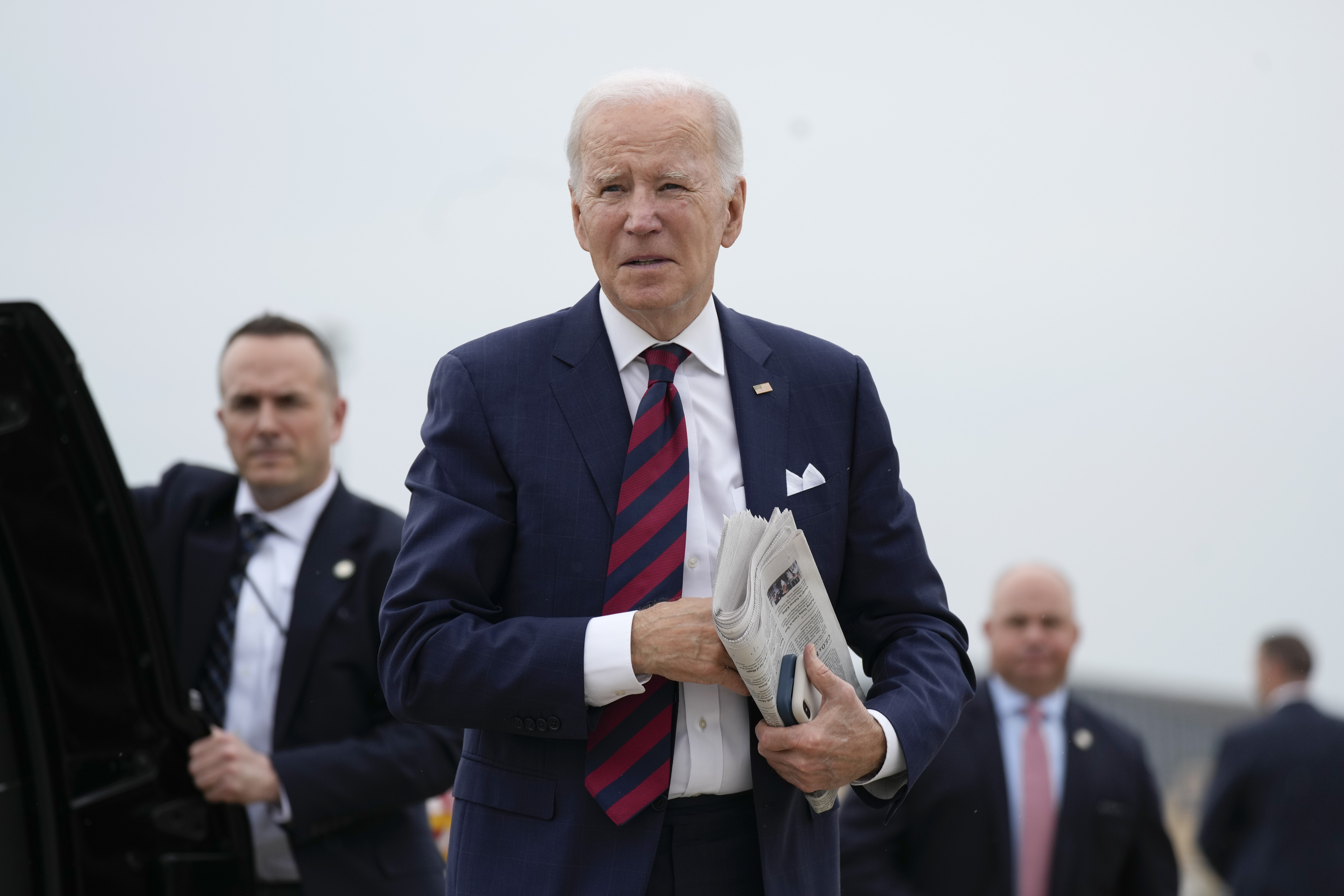Biden dives into debt ceiling talks, causing mini panics among his base
The White House argues it’s still not negotiating over the debt ceiling — just having budget talks with a debt ceiling component.


President Joe Biden finally feels good about his chances of striking a debt ceiling agreement in time to avert economic catastrophe.
Some of the White House’s closest allies are wondering if he’s feeling a little too good about it.
The emerging outline of a debt limit deal between Biden and House Republicans has fed growing dismay among progressive Democrats over the White House’s negotiating strategy — and raised fears that a president who once dared Republicans to test his resolve is preparing to give on a host of GOP demands to make the issue go away.
Sen. Elizabeth Warren (D-Mass.) described herself as “very concerned” about the direction of the talks, including mentions of a long-term cap on spending and additional work requirements. The unease by progressives about both, she said, has been conveyed to the White House.
“I’m very concerned about any efforts to just tangle aid recipients in red tape in the hope that they will be choked to death rather than get the help they need,” Warren said about the idea of additional work requirements.
She’s not happy about the idea of budget caps, either, calling them a “self-inflicted wound.”
The 2011 budget caps, which were negotiated by Biden as vice president in the Obama administration to get out of a similar debt ceiling standoff, “extended high unemployment for five years,” Warren said. “Those budget caps are not cost free. They keep the economy hobbled and that means fewer people with jobs, fewer mamas with access to child care, fewer sick people who can get well and get back to work.”
The rising discontent on the left complicates an extremely delicate negotiating period for Biden, who is slated to meet Tuesday with House Speaker Kevin McCarthy and other congressional leaders before leaving for a weeklong international trip to Japan and Australia. The memory of the 2011 debt ceiling deal still looms for many — and the president and his team had insisted they would never do something like that again.
To this day, the White House argues it is not actually negotiating over the debt ceiling, but merely having budget negotiations with a debt ceiling component attached.
But that appears to be a distinction without an actual difference. Concessions are being made. Over the past several days, White House aides have signaled openness to imposing caps on government spending through the end of Biden’s term. They’ve floated clawing back billions of dollars in pandemic aid once seen as critical to the agenda. And ahead of a third meeting with McCarthy, Biden suggested he’d consider restrictions on certain safety net programs for the poor.
In exchange, the White House is demanding that the GOP drop its effort to roll back parts of Biden’s key legislative accomplishments, like the Inflation Reduction Act, as well as take student debt relief off the table. It also wants to limit any spending caps deal to as little as two years, a far shorter duration than the decade sought by Republicans, and has rejected an initial proposal to set the caps hundreds of billions of dollars lower than current levels. And they want a debt ceiling extension of at least two years as well.
Such a deal would effectively get Biden through the 2024 election without having to negotiate over the debt ceiling again. But progressives warn it would also undermine the president’s economic record, and amount to a betrayal of Democrats who trusted the White House’s insistence it had learned the hard lessons of past debt limit showdowns.
“We’re buying into an argument that government spending is a problem and needs to be brought down — which I don’t love,” said Faiz Shakir, a senior adviser to Sen. Bernie Sanders (I-Vt.).
Inside the White House, aides acknowledged that Biden may take some blowback from progressives over any eventual debt ceiling compromise. But they downplayed Biden’s willingness to accept stricter work rules for safety net programs, arguing that the White House has already managed to safeguard big priorities like Social Security and Medicare that the GOP initially targeted.
“There’s not going to be a way to look at this and say McCarthy won,” said one adviser to the White House, adding that an eventual compromise may also burnish Biden’s political credentials as a dealmaker. “‘Joe Biden’ and ‘deal’ in the same sentence is an okay thing. He kept the crazies from crashing the plane.”
Another person close to the White House, who spoke about deliberations on condition of anonymity, contended that Biden was always going to have to compromise on spending once Republicans won control of the House.
The White House declined to comment on the state of the negotiations. But spokesperson Michael Kikukawa said in a statement Monday that Biden “has been clear that he will not accept proposals that take away peoples’ health coverage” or “push Americans into poverty” and would evaluate Republicans’ proposals under those criteria.
The White House is still planning for Biden to travel to Japan for the G-7 summit, amid concerns that any delay or cancelation would send a destabilizing signal to the financial markets — and disrupt a series of important international objectives.
But the administration is weighing contingency plans if the debt limit talks fall apart in the meantime, said aides familiar with the planning, who were granted anonymity to discuss internal conversations. Those plans include pushing Biden’s departure for Japan back a day or cutting post-summit stops in Papua New Guinea and Australia to meet with additional world leaders there. A full cancellation is unlikely, aides said, but no decisions will be made until after Tuesday’s meeting.
White House aides and congressional leadership staff worked through the weekend to craft policy options for Biden and McCarthy to consider, meeting twice again on Monday in an office in the basement of the Capitol. Legislative Affairs Director Louisa Terrell, National Economic Council Deputy Director Aviva Aron-Dine and Office of Management and Budget Executive Associate Director Michael Linden have represented the White House in the staff-level discussions.
The group has made steady progress, though there was disagreement as to how much. After Biden expressed optimism on Sunday that a deal would come together soon, McCarthy characterized the two sides as “still far apart.”
It was, however, Biden’s suggestion that he would consider restrictions on government aid to clinch the deal that alarmed progressives, who have urged the White House to safeguard programs like food stamps and cash assistance for low-income families.
House Democrats privately say members have drawn a red line around imposing new work requirements on recipients in those programs. A letter distributed Thursday by the House Democratic Caucus Poverty Task Force and House tri-caucuses was circulated in Friday’s debt limit staff negotiation as indicative of the conference’s broader position, according to a person familiar with the conversation granted anonymity to discuss the closed-door meeting.
“Decades of research and real-world experience show that taking basic assistance away from people who do not meet rigid work-reporting requirements does not improve employment,” the letter signed by seven House Democrats reads.
Biden on Monday appeared to oppose a GOP push to expand work rules for food aid, tweeting that the GOP’s “wish list would put a million older adults at risk of losing their food assistance and going hungry.”
“Rather than push Americans into poverty, we should reduce the deficit by making sure the wealthy and large corporations pay their fair share in taxes,” he wrote.
Biden won praise within his party when he initially vowed he would not negotiate over the debt ceiling. But that stance has slowly shifted ever since House Republicans pushed through a debt ceiling bill of their own. Biden in the meantime undercut suggestions he could invoke the 14th amendment and ignore the debt ceiling as an alternative. Those steps frustrated progressives who questioned whether the president and his aides could be driving a harder bargain with an unproven speaker in McCarthy.
Still, most are confining their criticism to private complaints out of a desire to maintain a united front against the GOP — at least for now.
“Biden’s earned goodwill of a sort, he’s kept a coalition together and everyone understands this is consistent with a Biden philosophy of being a peacemaker,” Shakir said of the president’s relationship with the left. The true test, he added, is what more Biden agrees to give up.
“I hope the answer is no, put a strong foot down and argue for your values and principles,” Shakir said. “But we’ll see.”












